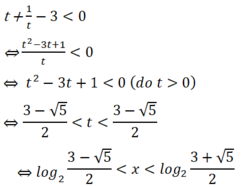
Hãy nhập câu hỏi của bạn vào đây, nếu là tài khoản VIP, bạn sẽ được ưu tiên trả lời.


a. Vì \(0< 0,1< 1\) nên bất phương trình đã cho
\(\Leftrightarrow0< x^2+x-2< x+3\)
\(\Leftrightarrow\left\{{}\begin{matrix}x^2+x-2>0\\x^2-5< 0\end{matrix}\right.\)
\(\Leftrightarrow\left\{{}\begin{matrix}\left[{}\begin{matrix}x< -2\\x>1\end{matrix}\right.\\-\sqrt{5}< x< \sqrt{5}\end{matrix}\right.\)
\(\Leftrightarrow\left\{{}\begin{matrix}-\sqrt{5}< x< -2\\1< x< \sqrt{5}\end{matrix}\right.\)
Vậy tập nghiệm của bất phương trình là \(S=\left\{-\sqrt{5};-2\right\}\) và \(\left\{1;\sqrt{5}\right\}\)
b. Điều kiện \(\left\{{}\begin{matrix}2-x>0\\x^2-6x+5>0\end{matrix}\right.\)
Ta có:
\(log_{\dfrac{1}{3}}\left(x^2-6x+5\right)+2log^3\left(2-x\right)\ge0\)
\(\Leftrightarrow log_{\dfrac{1}{3}}\left(x^2-6x+5\right)\ge log_{\dfrac{1}{3}}\left(2-x\right)^2\)
\(\Leftrightarrow x^2-6x+5\le\left(2-x\right)^2\)
\(\Leftrightarrow2x-1\ge0\)
Bất phương trình tương đương với:
\(\left\{{}\begin{matrix}x^2-6x+5>0\\2-x>0\\2x-1\ge0\end{matrix}\right.\) \(\Leftrightarrow\left\{{}\begin{matrix}\left[{}\begin{matrix}x< 1\\x>5\end{matrix}\right.\\x< 2\\x\ge\dfrac{1}{2}\end{matrix}\right.\)
\(\Leftrightarrow\dfrac{1}{2}\le x< 1\)
Vậy tập nghiệm của bất phương trình là: \(\left(\dfrac{1}{2};1\right)\)

\(5^{1+x^2}-5^{1-x^2}>24\Leftrightarrow5\times5^{x^2}-\frac{5}{5^{x^2}}>24\) (1)
Đặt \(t=5^{x^2}\), dk: \(t>0\)
\(\left(1\right)\Leftrightarrow5t-\frac{5}{t}>24\Leftrightarrow5t^2-24t-5>0\Leftrightarrow\left[\begin{array}{nghiempt}t< \frac{-1}{5}\left(loai\right)\\t>5\end{array}\right.\)\(\Leftrightarrow5^{x^2}>5\Leftrightarrow x^2>1\Leftrightarrow\left[\begin{array}{nghiempt}x< -1\\x>1\end{array}\right.\)

Nhận xét rằng \(\sqrt{5}-2=\left(\sqrt{5}-2\right)^{-1}\)
Do đó bất phương trình có thể viết thành :
\(\left(\sqrt{5}-2\right)^{x+1}\ge\left[\left(\left(\sqrt{5}-2\right)^{-1}\right)\right]^{x-3}=\left(\left(\sqrt{5}-2\right)^{3-x}\right)\)
\(\Leftrightarrow x+1\ge3-x\)
\(\Leftrightarrow x\ge1\)
Vậy tập nghiệm của phương trình là :
\(D\left(1;+\infty\right)\)

a) Bất phương trình đã cho tương đương với hệ sau:


Vậy tập nghiệm là (−1;0) ∪ (7/2; + ∞ )
b) Tương tự câu a), tập nghiệm là (1/10; 5)
c) Đặt t = log 2 x , ta có bất phương trình 2 t 3 + 5 t 2 + t – 2 ≥ 0 hay (t + 2)(2 t 2 + t − 1) ≥ 0 có nghiệm −2 ≤ t ≤ −1 hoặc t ≥ 1/2
Suy ra 1/4 ≤ x ≤ 1/2 hoặc x ≥ 2
Vậy tập nghiệm của bất phương trình đã cho là: [1/4; 1/2] ∪ [ 2 ; + ∞ )
d) Bất phương trình đã cho tương đương với hệ:


Vậy tập nghiệm là (ln(2/3); 0] ∪ [ln2; + ∞ )

Bài 1:
Vì $a\geq 1$ nên:
\(a+\sqrt{a^2-2a+5}+\sqrt{a-1}=a+\sqrt{(a-1)^2+4}+\sqrt{a-1}\)
\(\geq 1+\sqrt{4}+0=3\)
Ta có đpcm
Dấu "=" xảy ra khi $a=1$
Bài 2:
ĐKXĐ: x\geq -3$
Xét hàm:
\(f(x)=x(x^2-3x+3)+\sqrt{x+3}-3\)
\(f'(x)=3x^2-6x+3+\frac{1}{2\sqrt{x+3}}=3(x-1)^2+\frac{1}{2\sqrt{x+3}}>0, \forall x\geq -3\)
Do đó $f(x)$ đồng biến trên TXĐ
\(\Rightarrow f(x)=0\) có nghiệm duy nhất
Dễ thấy pt có nghiệm $x=1$ nên đây chính là nghiệm duy nhất.

Đặt :
\(t=\sqrt{x^2-5x+5}\left(t\ge0\right)\)
Bất phương trình trở thành :
\(\log_2\left(t+1\right)+\log_3\left(t^2+2\right)\le2\)
Xét \(f\left(t\right)=\log_2\left(t+1\right)+\log_3\left(t^2+2\right)\) trên \(\left(0;+\infty\right)\)
Do \(t\ge0\) nên \(\log_2\left(t+1\right)\) và \(\log_3\left(t^2+2\right)\) đều là các hàm số đồng biến, do đó f(t) đồng biến trên \(\left(0;+\infty\right)\)
Lại có f(1)=2, từ đó suy ra \(t\le1\)Giải ra được :\(1\le x\)\(\le\frac{5-\sqrt{5}}{2}\) hoặc \(\frac{5-\sqrt{5}}{2}\le x\) \(\le4\)
Ta có : \(f\left(x\right)=\frac{1}{2}5^{2x+1}\Rightarrow f'\left(x\right)=5^{2x+1}\ln5\)
\(g\left(x\right)=5^x+4x\ln5\Rightarrow g'\left(x\right)=5^x\ln5+4\ln5=\left(5^x+4\right)\ln5\)
\(f'\left(x\right)< g'\left(x\right)\Leftrightarrow5^{2x+1}\ln5< \left(5^x+4\right)\ln5\)
\(\Leftrightarrow5^{2x+1}< 5^x+4\)
\(\Leftrightarrow5\left(5^x\right)^2-5^x-4< 0\)
\(\Leftrightarrow-\frac{4}{5}< 5^x< 1=5^0\)
\(\Leftrightarrow x< 0\) là nghiệm của bất phương trình

Chọn A